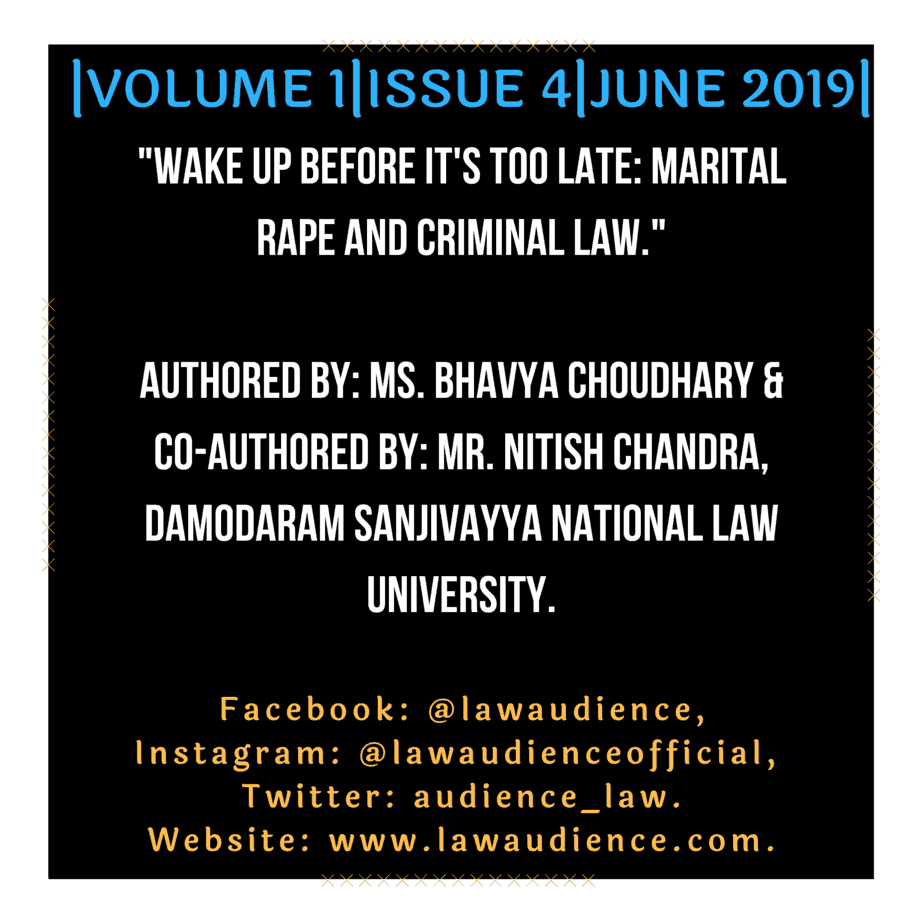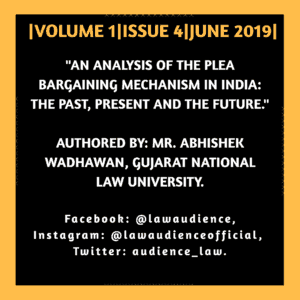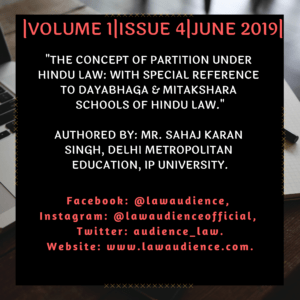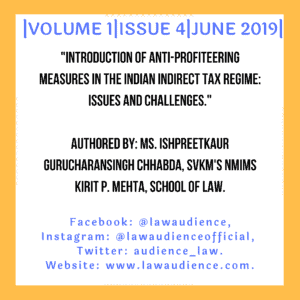Authored By: Ms. Bhavya Choudhary & Co-Authored By: Mr. Nitish Chandra, Damodaram Sanjivayya National Law University.
“Her friends used to tell her it wasn’t rape if the man was your husband. She didn’t say anything, but inside she seethed; she wanted to take a knife to their faces.”- H. Batacan[1]
I. WHAT IS MARITAL RAPE?
“Marital rape refers to unwanted sexual intercourse done by the husband to his wife either by force or threat or when is unable or not in such a condition to give consent. According to Section 375, Exception 2 of IPC, it states that Sexual intercourse or sexual acts by a man with his own wife, the wife not being under eighteen years of age, is not rape[2]. The issue of marital rape in India is highly neglected and there is a need for change in the provisions of IPC. This is a colonial Act and there are certain provisions in it which are required to be amended and marital rape is one of them. According to Sec. 375, Exception 2, a man can only be punished for marital rape if his wife is below eighteen years of age and is a minor. But it should be made punishable irrespective of the age of the wife. Neither is marital rape a ground for divorce.
Once a man is married, he is considered to respect and to treat his wife with dignity. This is an age-old concept but in reality, it is not so. There are many cases where women are being exploited by men. In Common Law, we do not have any remedy for such exploitation against women. However, in many other countries, marital rape is either an offence or the judiciary has actively been involved in bringing up reforms in marital rape. On the other hand, we are still sailing on the same boat that there is no need for an amendment to the exception which makes a man guilty only if he commits rape on his wife who is below eighteen years of age.
Howsoever, Sec. 375, Exception 2, makes it an offence to have sexual intercourse without the consent of the judicially separated wife and it comes under the preview of rape. In the case of Bodhisattva Gautam v. Subhra Chakraborty[3], The Supreme Court stated that rape is an act against humanity as a whole. However, the Court did not add anything relating to marital rape.”
II. MARITAL RAPE IN INDIA & OTHER COUNTRIES: AN OVERVIEW:
In 2005, the legislature passed Protection of Women Against Domestic Violence Act, 2005, which makes marital rape as a type of local violence[4]. Under this Act, a woman can go to Court and seek partition in case of marital rape. However, the Act only provides for civil remedies. In the current scenario, there is no criminalization of marital rape which is indeed needed and is the need of the hour.
II.I COMPARATIVE STUDY BETWEEN INDIA AND OTHER COUNTRIES:
According to the United Nation Population Fund, more than 2/3rd of the married women in India, who are aged between 15 to 50, have been beaten and raped by their husbands.[5] In 2006, United Nation Secretary Council made a deep analysis of all kinds of violence against women which amounts to marital rape. It came to the conclusion that there are 53 countries that have not criminalized marital rape and India is one of them. In the USA, the criminalization of marital rape started in the mid-1970s and in all the 50 states, marital rape became an offence by 1993. India is lagging behind. In India, marital rape is not made an offence yet. In the case of R. v. R[6], the House of Lords ruled that, “a husband could not be guilty of raping his wife if he forced her to have sexual intercourse against her will was an anachronistic and offensive common-law fiction, which no longer represented the position of a wife in present-day society, and that it should no longer be applied”. This judgment was also acknowledged by the European Court of Human Rights in the decision of SW v. UK[7].
In New Zealand, the marital rape was criminalized in 1985 when the present Section 128 to the Crimes Act, 1961 was passed. Sub-section (4) of Section 128 of the act provides that a person can be convicted of sexual violence in respect of sexual connection with another person notwithstanding that they are married at the time the sexual connection occurred. In Mexico, marital rape was made punishable for an imprisonment up to 16 years.
In Sri Lanka, marital rape is still not an offence made punishable under law. The legislatures of Sri Lanka have only given recognition to marital rape for the partners judicially separated.
III. INDIAN COURTS ON THE ISSUE OF MARITAL RAPE:
In the case of Sareetha v. T. Venkata Subbaiah[8], it was held that, “Rights and duties in a marriage, is like a creation and dissolution and not the term of private contract between two individuals. The right to privacy is not lost by marital association. Hence, there is no punishment for marital rape and the remedy lies with the wife”.
In Sakshi v. Union of India[9], the Supreme Court had recognised the inadequacies regarding the law relating to rape and had suggested that the legislature should bring about changes in the law.
After the Nirbhaya Case[10], the 2013 Amendment was brought in to make the punishment for rape more severe but there was no change in the condition of marital rape as given under the Indian Penal Code. The Judicial decision of Queen Empress v. Haree Mythee[11], it was held that, “If the wife is above the age of fifteen, the husband cannot be held liable for rape. In this case the husband was punished because the wife was of 11 years only”.
In the Kerala High Court, Sree Kumar v. Pearly Karun[12], it was observed that, “The wife does not live separately with the husband under the Judicial separation and being subject to sexual intercourse without her will the act does not amount to rape. Hence, it was said that, the husband was not found to be guilty of raping his wife though he was de facto guilty of doing or committing the act. The judiciary seems to hold an idea that rape within marriage is not possible or that the stigma of rape of a woman can be salvaged by getting her married to the rapist. Rather than, making the wife worship husband’s every whim, especially sexual, is supposed to thrive, mutual respect and trust. This ongoing crime is a huge violation of the fundamental right of freedom of married women as well as the right to their body”.
Independent Thought v. Union of India[13],
In this Case, the Supreme Court read down Exception 2 of Section 375 which now reads as “Sexual intercourse by a man with his wife, the wife not being 18 years”. Previously, the age was 15 years but now after the amendment of 2018, it has been changed to 18 years.
The Supreme Court stated that early marriage and sexual intercourse adversely affects the health of the girl child and so, for the best interest of the girl child and society as a whole, the traditional practice of early marriage should be given up very soon. The Apex Court also added that under Article 21, a girl child also has a life to live with dignity.
The girl child losses her self-esteem and is subjected to sexual abuse. Due to early marriage and regular sexual intercourse, there is a great possibility that she becomes pregnant though her body is not quite ready for procreation. The child born out of early marriage is more likely to be malnourished. The Court made a harmonious interpretation of POSCO Act (which would prevail over other law, being a special Act) and Indian Penal Code and therefore, the Supreme Court narrowed Exception 2 of Section 375.
IV. GOVERNMENT’S STAND ON THE ISSUE OF MARITAL RAPE:
In the case of RTI Foundation v. Union of India[14], the Government pleaded that:
- Material Rape should not become a phenomenon to harass the husbands which may disbalance the institution of marriage (as there is rampant misuse of Section 498A of IPC).
- If all sexual Acts with the wife of one will become marital rape, then it will be very difficult to prove it and to rely upon any evidence as there will be no lasting evidence of rape between a man and his own wife.
- 172nd Law Commission Report and in 167th Parliamentary Standing Committee on Home Affairs, have examined the matter thoroughly and did not recommend criminalization of marital rape. Adding to this, for the criminalization of marital rape, there must be moral and social awareness to stop the Act. There must be a change in the attitude of society.
- The mere fact that various other Countries have criminalized marital rape does not mean that India should also criminalize it. The population, condition, literacy rate, poverty, the mindset of society differs from Country to Country.
V. RECOMMENDATIONS MADE BY LAW COMMISSION OF INDIA AND JUSTICE VERMA COMMITTEE:
The issue was first dealt in 42nd Law Commission Report[15], which suggested two things:
- That the husband and wife who are judicially separated, the exception of the clause should not apply.
- That the non-consensual sexual intercourse between husband and wife aged between 12 to 15 years, should not be termed as rape, rather a section should be enacted for the same.
In the 172nd Law Commission Report[16], it specifically dealt with the validity of the exception clause. It stated that criminalisation of marital rape would lead to excessive interference with the institution of marriage.
The JS Verma Committee[17], formed in 2013 after the Nirbhaya kand, relied upon the European Commission of Human Rights, and came to the conclusion that rapist means a person who has done rape regardless of his relationship with the victim.
VI. CONCLUSION:
India has always been a male dominant society and not criminalizing marital rape shows the same. Women in India are always oppressed. This shows that India still carries a mind-set where men dominate women. We have come to an era where same-sex marriage is being allowed and homosexuality is no more a crime but with respect to marital rape, there has not been any improvement in the law.
It’s high time that we should understand that men and women have equal rights either be marriage or any other thing and the objectification of women and men thinking their wives as their own property should be done away with. After several path-breaking judgments of the Hon’ble Supreme Court of India (Sabarimala judgment, Sec 377 Judgment) in the year 2018, the time has come that we should realise the dreams of the founding fathers of the Constitution who thought of an India where each citizen has equality of status and opportunity which has been mentioned in our preamble.
After analysing various aspects of marital rape, we have come to the conclusion that marital rape must be criminalized. The exception that decriminalizes marital rape should be removed. Rather, it should be added that the relationship of husband and wife, should not be a defence for rape. Adding to this, there should be an amendment in the Evidence Act, stating that there will be no presumption of consent in case the accused is the husband.
[1] Sangamithra Logananthan, Marital rape, available at http://www.legalservicesindia.com/article/2369/Marital-Rape.html, (last visited March 17, 2019).
[2] Independent Thought v. Union of India, (2017) 10 S.C.C. 800 (India).
[3] Bodhisattva Gautam v. Subhra Chakraborty, A.I.R. 1996 S.C. 922 (India).
[4] supra note 1.
[5] Suvam Sharma and Niribili Konwar, Mass Media and Social Justice, https://www.academia.edu/35885964/MASS_MEDIA_AND_SOCIAL_JUSTICE_MARITAL_RAPE_IN_INDIA, (last visited March 19, 2019).
[6] R v R., [1991] UKHL 12.
[7] SW v. UK, ECHR 22 Nov 1995.
[8] Sareetha v. T. Venkata Subbaiah, A.I.R. 1983 A.P. 356 (India).
[9] Sakshi v. Union of India, A.I.R. 2004 S.C. 3566 (India).
[10] Mukesh Kumar & ors. v. State of NCT of Delhi, CRIMINAL APPEAL NOS. 607-608 OF 2017 (India).
[11] Queen Empress v. Haree Mythee, (1891) ILR 18 Cal 49.
[12] Sree Kumar v. Pearly Karun, 1999 (2) ALT Cri 77 (India).
[13] Independent Thought v. Union of India, (2017) 10 S.C.C. 800 (India).
[14] RTI Foundation v. Union of India, Special Leave Appeal (Civil) No. 23250 of 2008 (India).
[15] Law Commission of India, Indian Penal Code, Report No. 42 (June 1971), available at http://lawcommissionofindia.nic.in/1-50/report42.pdf (last visited on March 16, 2019).
[16] Law Commission of India, Review of Rape Laws, Report No. 172 (March 2000), available at http://www.lawcommissionofindia.nic.in/rapelaws.htm (last visited on March 16, 2019).
[17] JUSTICE J.S. VERMA COMMITTEE, Report of Committee on Amendments to Criminal Law (January 23, 2013).



